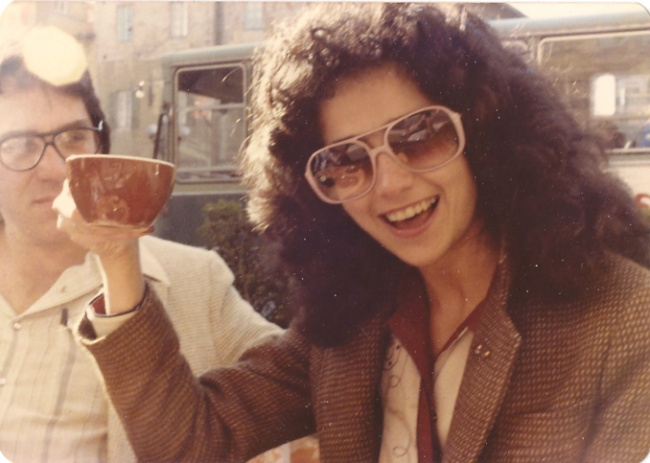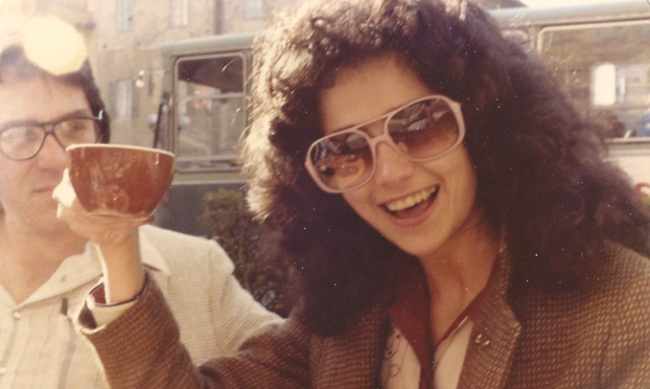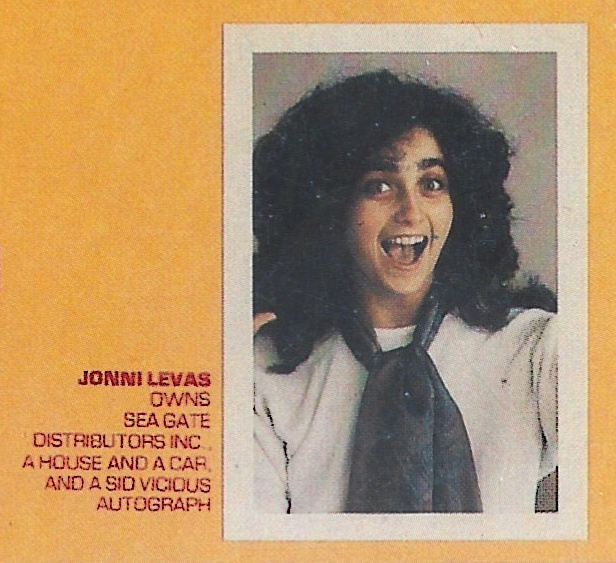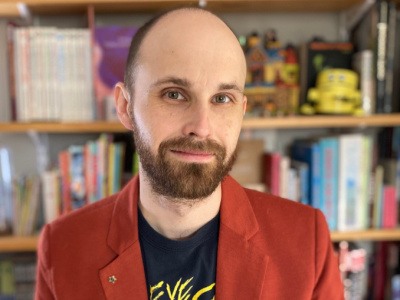
Image: Courtesy of Jonni Levas.
Jonni Levas during a 1978 trip to London with Phil Seuling, who is seated to the left.
Jonni Levas was a key player in the origins of the Direct Market, the co-owner, with Phil Seuling, of Sea Gate Distributors of Brooklyn. It was the first company to sell mainstream comics directly to comics retailers, bypassing the national network of news distributors.
People who worked with Sea Gate recall Levas as the levelheaded manager who kept things running while the dynamic and irascible Seuling was the company’s public face.
Then, after running Sea Gate from its founding in 1973 to its bankruptcy and end in 1985, she faded away from the world of comics and raised her daughter in New Jersey. She never came back.
"I feel that I lost myself somewhere," she said.

Image: Courtesy of Jonni Levas.
Phil Seuling (left) and Jonni Levas (right) at the Museum of Modern Art Sculpture Garden. Levas displays these two photographs together so that she and Seuling are looking at each other.
I interviewed Levas for my 2017 book, Comic Shop: The Retail Mavericks Who Gave Us a New Geek Culture. I felt like one shortcoming of many histories of comics retail was a minimization or even omission of Levas.
I spoke with her again this month by phone from her apartment on the New Jersey side of the Philadelphia area.
She was in good spirits, despite being in treatment for a rare form of bone cancer. She takes pride in the accomplishments of her daughter, who is a psychologist, and in the things she and Seuling once built.
She has a story to tell, about how she was a business owner at 18 and how that business helped to transform an industry.
'She Was Sharp'
Levas attended Lafayette High School in Brooklyn, where Seuling was one of her teachers. Outside of teaching, he had businesses selling comics and running comics conventions.
She graduated from high school at 16, having skipped two grades, and went on to New York University and a job at the Brooklyn Museum.
She left NYU and had brief stints at two other colleges.
This was around the time that she began a relationship with Seuling, who was more than 20 years older than her and divorced with two children.
"Of course people raised eyebrows," she said in one of our interviews in the mid-2010s. "After a while, when people saw we were still together, they stopped raising their eyebrows."
People who knew them at the time described Levas as hip, but not a hippie. She was a prominent member of a group of mostly young people who worked at Seuling's shows.
"I never looked at her as just the pretty face," said Sal Quartuccio, a publisher of fanzines and comics, who knew them both. "She was sharp."
Seuling had talked for years about wanting to start a business that would sell comics directly to retailers (see "Phil Seuling – the Man Who Invented the Direct Market"). His idea was that there was a growing number of stores that catered to comics collectors, and that retailers wanted to have a level of control over what they received that was not available from news distributors.
Collectors had long lamented that the existing distribution system meant that there was no way to know which titles would be at which stores, and some comics arrived in stores with damage from the shipping process.
His idea was to take orders from retailers, which would then get packed and shipped directly from the printers, skipping over the news distributors. Stores could order comics in specific quantities and have an expectation that the shipments would arrive with minimal damage.
But the publishers weren't interested, at least not at first.
Sueling persisted and continued to make his case over several years. Then, in August 1973, he and Levas were at the San Diego Comic-Con, where they had breakfast with Sol Harrison, a vice president at DC Comics. The San Diego convention would grow to become the largest in the world, but at that time it was smaller than Seuling's main show in New York.
Seuling and Harrison knew each other because of the New York show. Harrison "was an older gentleman, a dapper New York gentleman," Levas said. "He was funny and kind." By the end of the meal, they had a handshake deal to allow DC’s material to be sold directly.
They agreed to meet soon in New York to set the details. In the months to follow, Seuling would make similar agreements with Marvel, Archie, and Warren, which were other major publishers. The idea of direct distribution held appeal for the publishers because they were in a sales slump due to many factors.
At that moment, however, the new venture didn't seem big.
"It turned out to be monumental," Levas said.
The Business Brain of Sea Gate
Seuling and Levas were 50-50 partners in the new business, which didn't have a name at first. A few years later, they began to call it Sea Gate, after the gated community in Brooklyn where they lived together.
The new system had benefits and risks for retailers. Their orders had a greater wholesale discount than those from the old distributors, but also were nonreturnable. This meant that if a store ordered twenty-five copies of Superman and sold only five, it was stuck with the surplus. This was different from working with news distributors who gave credit for unsold copies.
Also, Sea Gate required up-front payment with each order, even though the comics didn’t ship until months later.
At that time, there were few retail outlets that could be called comic shops. If you broadly define "comic shop" to include used bookstores with large comics sections, there were fewer than two hundred stores nationwide, according to retailers from that time. Within this total were only a few dozen of the kind of comics specialty stores that would come to dominate the industry.
Seuling knew many of the store owners from his years of selling comics and running conventions. His personal connections helped the company to sign up customers and go through rapid growth in its first few years.
Seuling handled much of Sea Gate’s external relations with publishers and retailers, while Levas functioned as a chief operating officer, managing the business side.
"She was the business brain in that operation," said Ron Forman in a 2016 interview. He worked with Seuling and Levas as a sub-distributor and then co-founded Comics Unlimited, a rival distribution business, in 1977. He died last year.
Quartuccio had a similar assessment of how Seuling and Levas divided the responsibilities of running Sea Gate.
"He created all the mischief," he said. "He was just constantly moving, constantly doing something, constantly planning something, and she just made it all fall into place and kept control of it."
Asked to sum up her role, he said, "She ran the business."
Levas said she and Seuling talked constantly about business decisions, and both were involved in external and internal management. But Seuling was the public face of the company and she was mostly behind the scenes.
"I did whatever was necessary in order to run a warehouse, and an office full of people," she said.
A recurring theme of their business partnership was how Seuling would make an impetuous action or comment, sometimes alienating a customer, vendor or competitor, and Levas would serve as the diplomat to get the sides to relax and get along.
"He spoke his mind, whether he was talking about the Mets or something else," she said. "When he thought something or he felt something, he said it, you know, and yeah, there were a lot of pieces to pick up."
People who worked with her describe her as confident and formidable, but she remembers feeling intimidated at first when she interacted with people who had business training and were executives for large companies. She gained self-confidence as the company grew.
"I think people thought that I had some smarts and street smarts and knew what I was doing," she said. "And I hope they thought I was a decent human being."
Levas' business partnership with Seuling continued even after they split up as a couple in the mid-1970s. Levas later married Mike Luckman, a co-founder of the retailer Forbidden Planet of the United Kingdom, and they had a daughter.
Luckman, Levas and Seuling were among the business partners who owned the Manhattan location of Forbidden Planet that opened in 1981.
Levas said she and Seuling remained good friends and continued to work well together.
Losing a Best Friend
Sea Gate dominated the market for about five years, but the company’s success and the growth in the number of comic shops helped to spawn competition. Some rivals viewed Sea Gate as an illegal monopoly because of the relationships it had with the major publishers.
This resentment along with some personal animosity against Seuling led to a lawsuit in 1978 by Irjax Enterprises of Maryland, a company that wanted to be able to distribute comics from the major publishers without going through Sea Gate.
The personal element was that Seuling had written about Irjax in his newsletter to customers, referring to Irjax as "an off-the-wall pseudo 'distributor.'"
He referred to the leader of this rival company as a "sickie," and that set off Hal Schuster, a member of the family that owned Irjax. He viewed the message as a reference to the fact that his father, Irwin Schuster, used a wheelchair.
"That’s certainly not cool to have written that," Levas said.
The lawsuit was expensive and stressful for Sea Gate. It ended with a settlement in which the publishers agreed to open up their trade terms to other distributors, allowing Irjax and anybody else to do what Sea Gate had been doing almost exclusively.
In the rough-and-tumble competition that followed, Sea Gate continued to be among the market leaders for a few years, in part because of the inertia of the customers it already had. But the days of Sea Gate's dominance were over.
In the early 1980s, Sea Gate faced financial setbacks. Some of its customers went out of business, leaving large unpaid bills. Also, the company struggled to keep its costs in line with fluctuating revenues.
Then Seuling became ill. He noticed he was losing weight in the fall of 1982, Levas said. He saw several doctors before he got a diagnosis: sclerosing cholangitis, an inflammation of the bile ducts that leads to severe liver damage.
His treatment included small tubes attached to his abdomen that drained some of the waste. Despite the inconvenience of this, he kept working. His weight loss continued, to the point that he no longer looked like himself, and needed to rest for long periods.
He died in 1984, and Levas felt crushed by no longer having the person she considered her best friend.
She remembers working to keep Sea Gate from going bankrupt during his illness so that he would have health insurance. By the time he died, the company had become overwhelmed with debt.
By 1985, the company had filed for bankruptcy. Quartuccio recalls attending an auction at Sea Gate's offices that year in which all of the fixtures and inventory got sold for what seemed to him like pennies on the dollar.
It was important to Levas that she got to keep her desk, and she did.
She remembers the following few years as a blur. Her marriage was breaking down and would soon end in divorce. Two of her brothers died. She was trying to raise her daughter amid a sense of crisis and grief. (Luckman, Levas' ex-husband, died last year.)
She stepped away from the world of the comics business, partly because she was living in New Jersey and couldn't easily see people in New York, and partly as a matter of self-preservation because some memories of her time in the business hurt so much.
She sold items from her personal collection of comics and art to pay bills.
"I sold things that now, had I not sold even one of them, I would tell you when I was retiring," she said.
'Someday, Maybe'
Over the following decades, she worked a variety of jobs. She has spent about the last 20 years working for a student loan debt repayment company, calling people to help them get on track with repaying debt. She now does the job from home.
"It's something that I've been able to do … to get back on my feet financially and everything and have good health insurance and good benefits," she said.
She jokes that she will be able to afford to retire when she is 100.
A few years ago, she was diagnosed with chordoma, a bone cancer of the spine or skull. She has a tumor on her spine and has ongoing treatment so that it doesn’t grow.
She describes her situation with the cancer as stable, and is grateful to her extended family who were there for her when she was going through treatment that included radiation.
She is on Facebook and occasionally exchanges messages with other people from her past in the comics business, but mostly limits her interactions to a small group of family.
I asked her what it would take for her to go to a convention or some other comics gathering, and she said she didn’t know. But she expressed a desire to see some of the people from what she regards as her best years, people like Bud Plant, who runs a mail order comics business in California and was once a good friend.
"Someday, maybe," she said.
This article is part of ICv2’s Direct Market 50th Anniversary project. For more on the history of the comics Direct Market, see "Comics Direct Market 50th Anniversary."









